A Historical Perspective on Individuals Excluded During the Golden Age through Netflix’s Hollywood Series
Ryan Murphy’s 7-episode series, “Hollywood,” offers a glimpse into the secretive corners of what is often considered the golden age of cinema in America. It is a poignant and moving series that seeks to rewrite history and provide an alternate ending. Set in 1947-48, the show introduces fictional characters alongside real-life ones from the era, creating a sort of “what if” alternate universe. If you’ve seen Tarantino’s “Once Upon a Time… in Hollywood,” you’ll be familiar with this concept of alternate storytelling featuring added characters.
Netflix, with its unyielding focus on promoting ostracised groups that mainstream society, struggles to accept, seeks to normalize them in our lives. While this is an admirable goal, sometimes they miss the mark. As long as these characters’ appearances, beliefs, and stances align with the narrative, the audience won’t care. However, Hollywood has a history of manipulating characters and events for the wrong reasons. This show aims to rectify that.
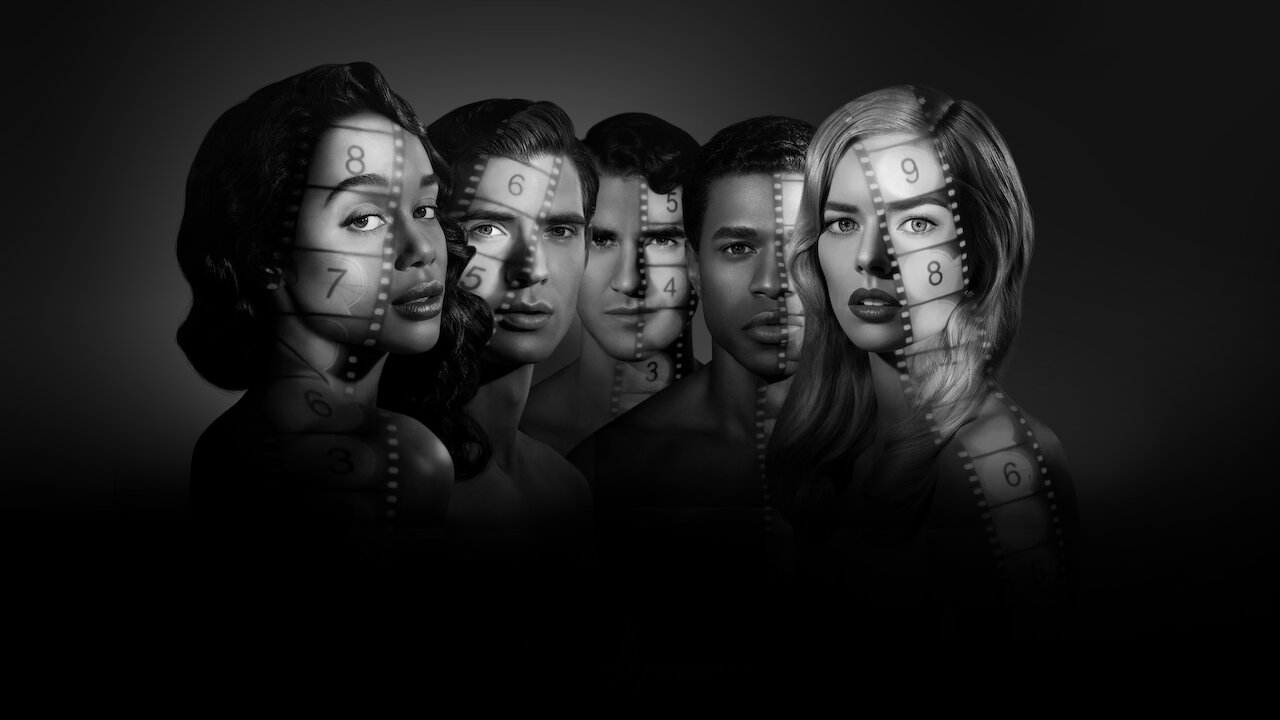
Rather than merely interpreting the events in the series, I will delve into the characters’ basics, their stories, and the reality of what happened during that time period. I will also discuss the significance of the names referenced or implied throughout the show. Finally, I will attempt to distinguish how much of the series is rooted in truth versus fiction, divided into four themes that the show explores.
Subject
Let us delve briefly into the subject matter at hand. It is the late 1940s, or perhaps early 1948, and Hollywood is in its prime. The streets of Los Angeles are overflowing with aspiring actors and actresses who are struggling to make a name for themselves. Jack Castello is among them, spending each day eagerly awaiting outside the doors of Ace Pictures for a chance to become an extra. However, when his aspirations fail to come to fruition, he reluctantly accepts a job as a gas station attendant under Ernie, who had hired him without prior knowledge of Jack. As Jack embarks on his new job, he discovers that his place of work is more than just a gas station, and being in dire need of income, he finds himself becoming a gigolo for cash. Despite feeling ashamed of his job, Jack’s network begins to expand, and he inadvertently finds himself crossing paths with the crew of a movie that would change the course of Hollywood’s history, one by one.
“Hollywood,” as a show, may not be readily embraced by everyone, especially not in the country I currently reside in, and its derivatives. Even in 2023, the majority of its content may still be unsettling. However, I hold the utmost respect for those who do not resort to hurling insults or protesting with banners, or worse still, throwing Molotov cocktails at people’s homes, much like the events depicted in the show. You are not obligated to like anyone, but it is crucial that you do not inflict harm upon them or launch any attacks. So with that said, let us begin exploring the foundation of Hollywood and the dirt that lies beneath it.
Being a Woman in Hollywood
Hollywood’s golden era spanned from 1915 to 1960, with the period commencing with the release of “The Birth of a Nation,” directed by D.W. Griffith in 1915, and progressing steadily every year thereafter. Many movies that are now considered cult classics were produced during this time frame. Moreover, this period marked the development of women’s representation in cinema. In fact, women have played a significant role in the movie industry since its nascent stage. Women such as Alice-Guy Blache and Lois Weber held top positions in critical film companies, either directing or acting. Actresses were the primary attraction for moviegoers.
To the extent that in the early days of cinema, players’ names were not even featured on movie posters. This practice, however, was altered for D.W. Griffith’s frequent leading lady, Lillian Gish. As the viewers wondered who the woman on the screen was, the actresses’ names were gradually added to the films, and ads were created featuring them. For example, “Biography girl Lillian Gish!” Similarly, Florence Lawrence is considered the first movie star in cinema history, while Asta Nielsen is regarded as the first European star.
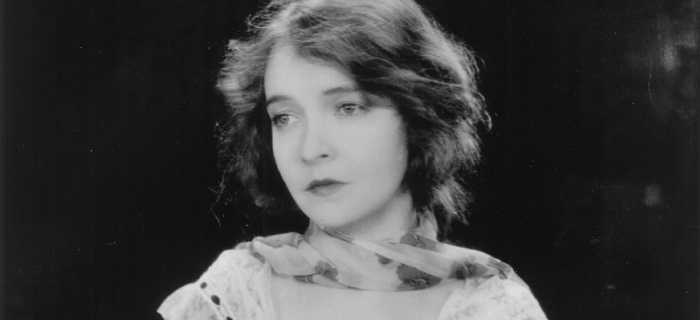
As the movie industry relocated from New York to Los Angeles and became more of a factory, women’s significance began to decrease. It would be optimistic to claim that it was not an intentional reduction. At the outset, Hollywood had numerous female screenwriters, with women winning the screenplay awards at the first few Academy Awards ceremonies. Frances Marion won the award for Best Writing in the third and fourth Academy Awards. However, during the growth of studios, women were relegated to the background. As depicted in the series, women were restricted to the role of homemakers, regardless of whose wives they were.
Nevertheless, women who were relegated to the kitchen were still the primary reason why viewers came to the cinema, but their viewership and earnings were never equivalent. This problem persists to this day. As men’s influence grew in the industry, they began to leverage it. Cecil B. DeMille made an explicit offer to aspiring actresses or writers who visited his office:
“If you make love to me on a bearskin in front of my fireplace, we’ll see your future.”
(This is a fact-based impersonation)
The United States experienced its most dynamic years during wartime, as no foreign conflict ever touched American soil. Although the nation was remarkably industrious, claiming it was entirely free would be inaccurate. In 1934, the Hays Code was established, ushering in official censorship of films in America. This led to the enforcement of certain stereotypes, restrictions on the depiction of specific values, and a ban on unhappy endings. Between 1915 and 1945, women’s lives on screen and in real life were often interchangeable. Women were expected to constantly trail behind men, both in their daily lives and in films. This deeply ingrained understanding was so pervasive that even Avis, a mother who advocates for freedom, views her daughter as an object who should remain at home or get married. It takes her a while to realize how talented her daughter is and how much she cares about her family.
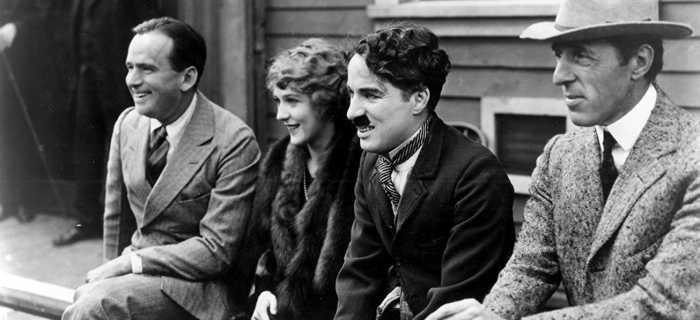
The studio portrayed in the series as Ace Pictures is believed to be Paramount, as the studio’s entrance and interior design shown in the series bear a striking resemblance to Paramount’s studios. Additionally, frames of Paramount’s contract actors, such as Humphrey Bogart, Bette Davis, and Betty Grable, can be seen in the background. The series portrays Avis Amberg inheriting the company after Ace Amberg is hospitalized due to some misfortune. Naturally, when a company or any job is handed over to women, they tend to make bold decisions, as depicted in the series. Women holding high positions was uncommon at the time but not unheard of.
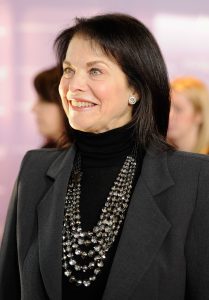
Mary Pickford was one of the most significant actresses of the pre-second-war era, and her salary was even higher than some men’s. She even co-founded the United Artists film company with three major names: Douglas Fairbanks, Charlie Chaplin, and D.W. Griffith. However, exceptions like Pickford did not break the rule. Avis Amberg represents a beautiful dream that remained a rarity in reality. In fact, it took until 1980 for a woman to become the director of a major film company. Sherry Lansing was the first to earn this title as the director of 20th Century Fox, 32 years after the fictional Avis Amberg took over Ace Pictures. Interestingly enough, Sherry Lansing also came from an acting background.
While the series portrays Peg Entwistle, the movie’s main character they are struggling to shoot, as infamous for jumping down from the Hollywood sign, a closer examination of her story reveals a much deeper complexity. Peg was no ordinary individual; she had appeared in over 200 plays on Broadway and was renowned for her exceptional talent, so much so that Bette Davis aspired to be like her. In 1976, at the age of 17, Davis saw Peg perform on stage and was captivated by her performance.
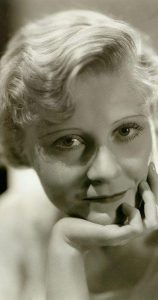
Peg found herself caught in the middle of the famous Great Depression, and after losing hope in returning to Broadway, she set her sights on the silver screen. Unfortunately, the only film in which she appeared, Thirteen Women, was only released posthumously. The director of the film, David O. Selznick, who is mentioned in the series, decides to quit directing during the course of the show.
Peg’s depression was not solely the result of her failed career but also her personal life struggles. These issues were, unsurprisingly, related to a man. She had been deceived by a man and committed suicide at a young age, thinking that her aspirations would never come to fruition. In the note that she left before taking her own life, she wrote,
“I am afraid, I am a coward. I am sorry for everything. If I had done this a long time ago, it would have saved a lot of pain. P.E.”
Being Black in Hollywood
The series asserts that a Black actor can’t succeed in Hollywood except conforming to specific stereotypes. Moreover, the series reveals that Black directors and producers are effectively excluded from the industry altogether. Despite the studios’ attempts to invoke the Hays Code as justification for their discriminatory practices, they were, in fact, rife with racism. After all, the roots of Hollywood are steeped in racism, as evidenced by “The Birth of a Nation”, a film that demonized Black people and marked the beginning of Hollywood’s golden age.
However, this does not mean that Black people are absent from the cinema or incapable of making films. In the pre-Hollywood era, a film company called Lincoln produced films featuring all-Black casts. Although the company managed to produce five films, only one has survived to this day. Unfortunately, due to racism and discriminatory laws, these films could only be screened in certain cinemas and institutions. The company was founded in 1916 by Noble Johnson but lasted only until 1921. Its existence proved that there was a demand for Black films, but as depicted in the series, it was exceedingly difficult to create them due to societal barriers.
Archie Coleman is a character who is acutely aware of the limitations imposed on him by his identity. Like many Black actors of the time, he had to endure a great deal of suffering. If they dared to exceed the boundaries imposed upon them, their homes would be attacked, and they would receive death threats over the phone. In the series, Archie defies societal norms by owning his script and openly acknowledging his homosexuality, and he even confronts society with his boyfriend. This is a tremendous feat for that period. Notably, Hattie McDaniel, the Oscar-winning actress whom we saw kissing Tallulah Bankhead in the series, may not have been gay in reality, as the show suggests. Perhaps, unlike the series, Hattie did not wish to endure the challenges of being both Black and gay.
“Follow your conscience and do what is right, for you will face criticism regardless.”
Eleanor Roosevelt
This quote by Eleanor Roosevelt highlights the reality that individuals will be scrutinized regardless of their actions, emphasizing the importance of following one’s own moral compass. Similarly, the depiction of Hattie McDaniel’s experience at the Oscar ceremony in the show is incomplete. While she had stated that the officials did not allow her to attend the ceremony due to her race, the show overlooks the fact that Clark Gable, her co-star in the movie, stood up for her and threatened to make a scene if she was not allowed to attend. The show also uses this incident as a plot point for Camille, a character who encounters a similar situation and vows to follow in Clark Gable’s footsteps. However, unlike Camille, Hattie’s career did not flourish after her Oscar win, and she continued to receive minor roles except for a television show where she played the lead role from 1950 to 1952 before passing away.
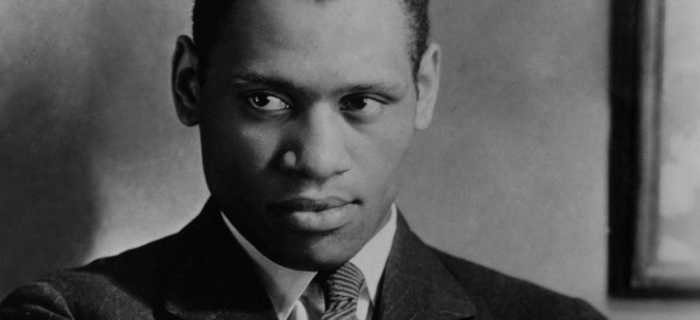
One of the primary themes explored in the show is the constraint faced by individuals to conform to societal norms and expectations. Despite the support of many in the industry, black individuals still faced significant challenges due to economic and moral considerations. Some black individuals also internalized this constraint, exemplified by Archie’s character, who struggles to confront societal norms. However, Archie’s story resembles Oscar Devereaux Micheaux, the first black director in Hollywood who directed for Lincoln and made 44 films that highlighted the issue of racism. Oscar also authored seven novels, including one released in 1913 titled “The Conquest: The Story of a Negro Pioneer,” which sold 1000 copies anonymously. The novel addressed America’s potential and the differences in lifestyle between urban and black individuals, with the protagonist’s name being Oscar Devereaux. In order for the book to gain readership, Oscar had to assume the identity of a white author. The topics that Oscar highlighted in his work, like Archie’s story in the show, are poignant and thought-provoking.
Through the assistance of Avis Amber and her team of supporters, “Meg” comes to fruition. In this world, the first-ever black screenwriter is nominated and awarded an Oscar, while Camille claims her rightful place as the first black leading actress in history. It is not a far-fetched dream that their film becomes a box office success. As mentioned earlier, there was significant interest in films featuring black actors during the Lincoln era, and a large audience eagerly awaited these movies.
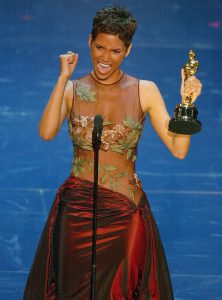
However, no one was willing to take responsibility for them. The harsh truth is that Halle Berry was the first black woman to win the Best Actress award in 2002, while Jordan Peele was the first black person to win the Best Original Screenplay award in 2018. This is no laughing matter. In 1949, 20th Century Fox attempted to produce a film called “Pinky,” which revolved around the love story between a black nurse and a white man. Yet, due to external pressure, the lead role was given to the milky white Jeanne Crain, and the only black woman in the film was still a maid – a cruel irony indeed.
Being a Foreigner in Hollywood
At that time, Hollywood’s hypocrisy knows no bounds, and it’s particularly galling considering that immigrants built the foundation of America’s cinema culture. Despite this fact, many Hollywood insiders have been known to ignore their own identities and exclude Jews, Chinese, and other immigrants, catering instead to what they perceive as the most “American-feeling” audience. In reality, it was the Spaniards who laid the foundations of Hollywood, but it was the Jews who built the system and created the superheroes that have since become box-office sensations and symbols of nationalism. However, only recently have people begun to appreciate the values of these pioneers.
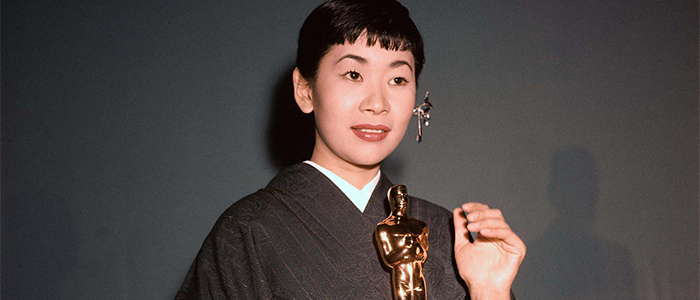
As the show highlights, being a foreigner in Hollywood was an uphill battle. Even mega-star Greta Garbo was excluded because she couldn’t speak proper English. For foreigners, finding roles beyond certain stereotypes was extremely difficult. Chinese actors, for example, were limited to coquettish female roles and were rarely cast as leads. Black actors were similarly restricted, with many only being offered roles as maids or fools. Anna May Wong was a prime example of this.
Despite being born in Los Angeles, she was treated as an outcast by later arrivals, and by the time we met her in the show, she had not acted in movies for nearly seven years. Her conversation with Dick and Archie highlights the truth behind the industry’s bias. For example, producer Irving Thalberg cast Luise Rainer in the lead role of “The Good Earth” because of Hays’ laws, which prohibited a Chinese woman from playing opposite a white man. Even when Anna May Wong was offered a role in the film, she refused to play the sultry woman because she couldn’t stomach her pride. As the show illustrates, simply appearing on screen and delivering even a single line was a significant accomplishment at the time. While Miyoshi Umeki became the first Chinese actress to win a Best Supporting Actress Oscar in 1957, no Chinese actress had yet won the award for Best Actress.
The recurring question “Where are you from?” in the series highlights the significant importance placed on one’s origins, as it was difficult to advance in Hollywood without powerful connections. Actors and actresses were often forced to alter their names and personalities to fit the Hollywood mold.
Being Gay in Hollywood
Identity has been a long-standing issue in Hollywood, and watching “Hollywood” may prompt the question, “Is everyone gay?” The answer is yes, most, if not all, were gay. The erasure of LGBTQ individuals from history is an unfortunate reality, but it does not negate the fact that Hollywood has always been a place filled with same-sex love and famous individuals dressing in drag at private parties. The series may seem like an exaggeration to some, but the majority of the characters and events are factual and accurate. For instance, Henry Willson was indeed gay and quite wishy-washy. Similarly, Rock Hudson was gay and had a boyfriend. Furthermore, the gas station featured in the series was an actual establishment!
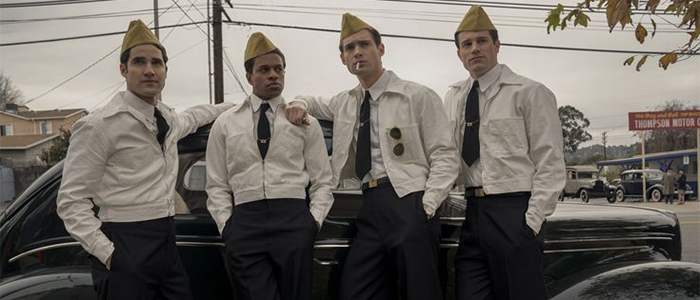
The gas station scene is based on a real story detailed in Scotty Bowers’ 2012 book, “Full Service: My Adventures in Hollywood and the Secret Sex Lives of the Stars.” Surprisingly, the likes of Katharine Hepburn, Cary Grant, and King Edward VII were among the clients. Bowers, like Jack Castello in the series, moved to Los Angeles with dreams of making it big, only to end up working at a gas station. After a client propositioned him for sex in exchange for money, the gas station evolved into the underground sex club depicted in the show. Bowers claimed that approximately 90% of his clients were gay, and he wrote the book because everyone he mentions in it had already passed away and could no longer be offended.
Let us delve into George Cukor, one of the prominent directors of the renowned film, Gone With the Wind. The portrayal of the parties in the series is not a mere work of fiction; they did take place in reality. Although rumors circulated that Cukor was gay, there was no concrete evidence to prove such claims, just as they could not establish Dick Samuels’s sexual orientation on the show. Cukor would host extravagant parties during the day with women in attendance, and in the evenings, it would be the men’s turn. While some people assert that the parties were not as wild as depicted in the series, some sources affirm that they were indeed as raucous.
One of the guests at Cukor’s party was Tallulah Bankhead, an eccentric personality recognized for her extravagant lifestyle and open-minded approach to relationships, irrespective of gender. Despite her extraordinary vocal prowess, she tarnished her career due to her constant partying, addiction to alcohol, and other vices. As previously mentioned, it would not be surprising if she had a romantic affair with Hattie McDaniel, who also frequented Cukor’s parties, as did Vivien Leigh. The latter, she had known Cukor since 1931, when they worked together. Interestingly, Tallulah almost secured the role of Scarlet O’Hara, which ultimately went to Vivien Leigh.
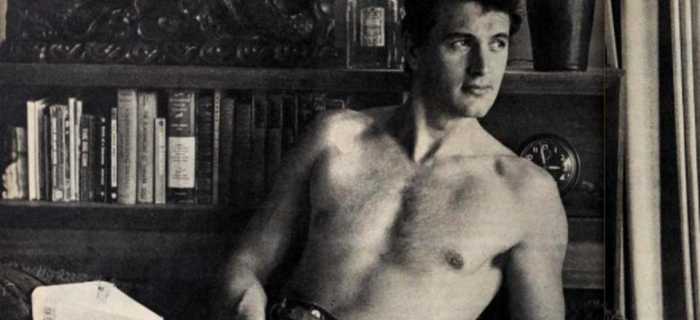
Now, turning our attention to Henry Willson, according to Rock Hudson, he was a psychopathic talent agent who sadistically exploited his actors’ repressed sexual desires. Henry was, in fact, gay, and his partner, Junior, really died in a fatal car accident. He then took out his frustrations on his actors. Although he was a successful talent scout, and some of the actors he brought to Hollywood were gay, his most significant contribution was Rock Hudson.
If you found Jake Picking’s portrayal of him in the series wanting, that means he made astonishing acting. Henry transformed a physically weak man into a perfect man for the time. As depicted in the series, Rock Hudson was gay, but he never revealed his sexual orientation publicly. It was only when he was terminally ill with HIV that his sexuality became public knowledge. For years, the actor kept his homosexuality a secret for fear of harming his career. Rock, who could not escape Henry’s clutches until 1960, referred to him as someone who treated his actors like toys to fulfill his sexual desires. Ironically, nobody wanted to work with Henry after discovering he was gay. However, it was not because of his sexuality; instead, they did not want to be objectified. Henry also succumbed to alcohol and drug abuse, which ultimately contributed to his death.
Let us delve deeper into the life of Rock Hudson, whose career commenced in 1948. During the testing phase for his first movie, “Fighter Squadron,” he had to repeat the shoot 38 times, just as depicted in the series. Despite the persistent burden of his repressed sexual identity, Hudson steadily progressed toward success over time without ever relinquishing his true self. To remove any possibility of his identity becoming public knowledge, Willson arranged a marriage between Hudson and his secretary, Phyllis Gates, although it did not last long. Hudson had a male partner in the 1960s and possibly even in the 1940s, and he attended the Oscars with him. However, they were not able to walk hand in hand, as portrayed in the series. Hudson even confessed his love for this person in his self-written biography.
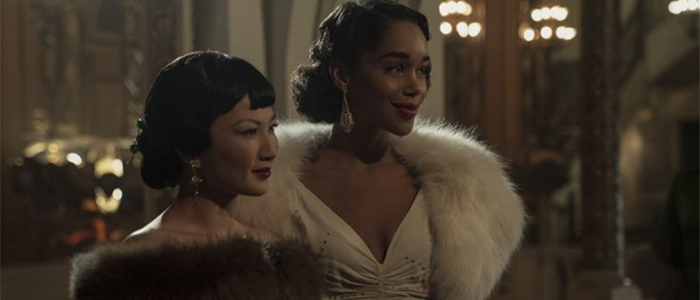
Returning to the fundamental question at hand, are all individuals gay? Although there have always been same-sex relationships throughout history, as previously mentioned, they have had to remain concealed for the most part, except for certain instances. While there have been some bold exceptions, they do not negate the rule. For instance, in 1895, Dickson, one of Edison’s operators, produced a movie called “The Gay Brothers” before the Lumiere brothers premiered their films. During that period, men were not recognized as queer; instead, they were generally referred to as effeminate. There was not even an adjective for women. Nonetheless, the people who viewed this movie, as it stands, were astounded!
Similar to pre-Hollywood black individuals, gays could appear in films and were frequently portrayed as comical characters. The first lesbian movie, “A Florida Enchantment,” is an example of this. The phrase “sissy,” uttered by Henry Willson in the series, was coined during this period. Subsequently, during the Great Depression, when the number of films dwindled, some producers attempted to include homosexuals in their movies to shock the audience. However, this ploy had a detrimental effect. Up until that point, gay characters, like black people, who were able to find a place on the screen, were erased through Hays laws. Although there was no direct stance against homosexuality in the Hays laws, some individuals exploited the law as a tool, transformed gay characters into foes, likewise black people, and introduced new labels, such as sick, sadistic, anti-social, and psychopath.
Let us return to our central inquiry once more: Is everyone homosexual? The character of Joel Cairo in the acclaimed film-noir, “The Maltese Falcon” was homosexual. However, his sexuality was not explicitly portrayed in the movie. In William Wyler’s stage adaptation of “The Children’s Hour,” the story centers around a heterosexual relationship. Yet, in the original play, two women are accused of having a romantic affair. Film critics have praised the removal of the lesbian storyline from the adaptation, arguing that the revised version was more successful. Now, do you understand why many people assume that LGBTQ individuals are a new phenomenon? This is because, like all marginalized communities, their stories have been silenced.
A Happier Way
“Hollywood” is a much more intricate and multifaceted world than we see on the silver screen. It is analogous to the inner world of an individual. There are more stories behind the sets than what meets the eye on the screen – those who compromise their integrity to achieve success, those who chase opportunities, those who hold others back, and those who must conceal their identity and thoughts. Nowadays, there are more opportunities to be open and truthful. However, still, numerous individuals think only of their wealth and strive for power. But in the past, it was nearly impossible for individuals to express their opinions. Their desires and ideas could only be explored in seclusion, among a select few, or on obscure backstreets. Ryan Murphy created a series exploring what would happen if the Pandora’s Box of Sexuality found the courage to emerge. The result is a path that is aesthetically and emotionally pleasing. It is difficult not to be moved by the conclusion.
The central focus of this discourse is the persistent nature of social problems that require active efforts to be resolved. The proposition that viewers would not watch movies featuring black actors is invalid, as thousands would watch such films, and through continuous exposure, viewers will become accustomed to it and return to cinemas. Despite objections, Netflix has continued to feature LGBTQ characters in its productions, and while critics may complain, they still consume its originals.
Therefore, the idea that things would have been different if they had been done rather than excusing inaction is a compelling notion. Although obstacles will always exist, progress can be made by working together. The concept of supply and demand is frequently misconstrued, as producers control the industry, not the consumers. While thousands of people may say they do not want to see LGBTQ characters on screen, they still watch Netflix’s programming because they consume what producers offer.
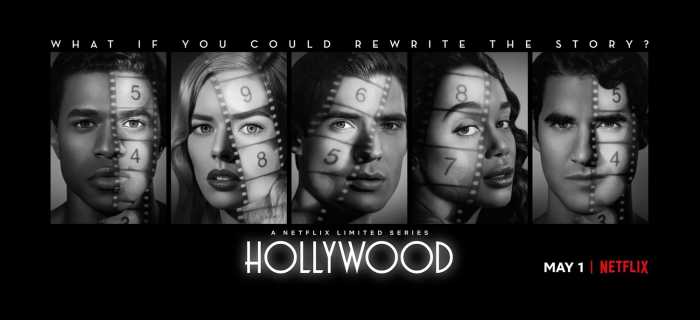
“Hollywood” is a heartwarming series, and as previously stated, it presents a fictitious alternate universe. All individuals have the right to be respected, even if they are not well-liked. No one should be excluded from appearing on the big screen simply because of their race or ethnicity. Personal prejudices must not impede others’ dreams.
In conclusion, let us embrace love and respect for all.
Works cited
Teksoy, Rekin. “Cinema History” Turkey: Oğlan Yayınları, 2014. Print.
Robb, Brian J. “Silent Cinema” England: Oldcastle Books, 2007. Print.
Chansel, Dominique. “Europe On-Screen: Cinema and the Teaching of History” Belguim: Council of Europe, 2010. Print.
Onur, Nur. “Kitle Kültürü Sineması ve B Filmi” Turkey: Hayalperest Yayınevi, 2012. Print.
Scognamillo, Giovanni. “Amerikan Sineması” Turkey: Ağaç Yayıncılık, 1994. Print.
Holm, D.K. “Independent Cinema” England: Kamera Books, 2007. Print.
What do you think? Leave a comment.











Great write up and a sweet sentiment to conclude.
It’s a brilliant comment on American Conservatism and morality, very well acted throughout with a lot of actors Murphy clearly trusts.
I like the counterfactual element outing Hollywood for not being brave in these decades. Apart from that, it is a huge dose of fun and you can see the cast enjoying themselves immensely.
It’s a great, stylish romp through Hollywood. It’s not meant to be deep or meaningful.
I enjoyed it but the ending was just a step too far, I felt it demeaned all the struggles of the people who suffered under the restrictions of Hollywood and that annoyed me, Hollywood Babylon was closer to the truth, I thought Jim Parsons chewed the scenery kudos to him.
Compared with some of the other crap on Netflix at the moment this show is definitely worth watching. It’s not perfect and the last two episodes probably should have been extended to three. The highlight of this series is the less reputable characters and the examination of what went on in the shadows in old school Hollywood. It’ll certainly have you googling fact from fiction afterwards.
The ending was inevitably going to be a happy, false reality but it still makes for an entertaining watch. I couldn’t stand Jim Parsons in Big Bang Theory but in Hollywood he had me laughing pretty much every time he had a scene.
I loved this show that I just wanted more after I binged watched the entire series last night.
I must be very old fashioned because I can’t get over the fact that most actors had to prostitute themselves to get a role/job. Were they all starving/homeless that they could never say no ? And Hollywood was even then, full of Weinsteins.
It’s a boring (and stupid) FANFICTION dedicated to Hollyweird!
I am loving it! The way it expresses that Hollywood has always had the power to change things…well hasn’t it? There’s so much to say but just watch and see what you think. It’s sexy, it’s big, it’s wow, and it’s making me root for every damn underdog in the show!
I love Ryan Murphy. He has done so much to actors with little representation(ie-older actors and actresses, lgbtq, minorities and woman minorities). This mini series shows how different the world could have been if people made different decisions. It’s sad that in real life the first black screen writer didn’t win that award until 2018. I balled my eyes out at the end and in so many parts because of things could have been so different, I like embarrassingly cried so many times.
Shows like this and The Boys I love because it doesn’t paint the world gold, it shows its actually a shit show.
This is the epitome of revisionist history. For a movie to be made with a black actress to win the Oscar in the early 1950’s and have Rock Hudson walk hand in hand with his gay lover at the Academy Awards is pure fantasy for the times.
This show was literally one of the best shows i’ve ever watched. Amazing.
Hollywood regularly takes liberties with history, and much more egregious than these.
Most of Murphys shows are hollow but so what they are hugely entertaining.
Well “Once Upon a time in Hollywood” is on Sky Cinema this weekend! Guess which one is better.
Funny, it’s also a wish fulfillment fantasy. Tarantino gets away with it and Murphy gets slammed. Maybe because when Tarantino spins his fantasies about Nazis, slaveowners and Manson groupies getting theirs, he throws in enough gratuitous violence that we don’t get annoyed at how trite it all is. With Murphy though, it’s just too obvious.
Tarantino peddles the same kind of counter-factual muck — like this Hollywood series it’s really programming for children, or at least teenagers who want the comic-book version of Hollywood history. It’s dreck. The real history of film is much, much more interesting. And it’s out there to be found. If you want to start at the beginning, go with Kevin Brownlow and David Gill’s series about the beginnings of the industry. It was made in 1980 and can be found on YouTube. Coincidentally it’s also called Hollywood, but it earns the title.
Fast becoming one of my all time favourite films. Saw it twice at the cinema, again at Christmas and once more last night. Every time I watch it I like it even more. Which is very rare for a modern movie for me.
There’s so many brilliant details and references, all of the performances are mint and the soundtrack is perfect. Damian Lewis as McQueen might be the only bum note.
I’m not even that much of a Tarantino fan usually and haven’t really liked anything of his since Jackie Brown. But Once Upon a Time… is his most heartfelt, grown-up and human movie. I honestly didn’t think he had it in him.
I will admit that it helps if you’re a massive vintage movie and tv geek though, otherwise a lot of the brilliance will be lost. Still, good to have a big budget mainstream film made for people over 35 for a change. They’re few on the ground these days.
And awaaaay we go…
They are entirely different beasts. The counter factual component to Tarantino’s film only related to the ending, and there was a very specific point to that beyond ‘gratuitous violence.’ Murphy’s show is all about putting a new spin on things, but just for the hell of it, there doesn’t seem to be a point.
What is the point doing an alt-history fantasy about how blacks, women and gays could be accepted in Hollywood when we have an actual history of this happening, where real people who really lived fought for this? Why not do them the honor of telling their stories, lightly fictionalized if needed to mollify the lawyers?
Making up an entirely new story is just rude to those people, whose stories deserve to be told much more than Ryan Murphy’s ego needs to be stroked.
What I mean is like this: In the 1950s, Sidney Poitier became famous for being the first black leading man allowed to be powerful and sexy. Now how did that happen? It sure didn’t happen by accident. It’s a sure bet that powerful people fought that change. Maybe there were previous attempts that failed. Who were those actors? What happened? Who was trying to make this happen? Tell their stories! I know nothing about all that, and I bet it’s a damn good story.
I enjoyed it really well cast and looks good. Something is definitely missing from it but can’t quite put my finger on it. Jim Parsons is great in it, nice to see him show what he can do as an actor other than playing Sheldon. This could definitely be better looking forward to see where it goes if another season is made.
Could this see the start of Jim Parsons breaking away from Sheldon?
I’m up to episode 4 and it’s great entertainment, well cast, well acted and a lot of fun.
Just watched the first episode of Hollywood and it’s a terrific start.
I really don’t understand what the problem with choosing a fiction format over a real-life docu-series and portrayal of the industry’s problems. I actually just finished the 1 season and I did prefer the fictional format as it allowed for further character development.
I don’t think the problem is with the series being a fictionalised counter-history. I was really looking forward to it and seeing what Murphy came up with. But he trots out well-worn stories without adding layers. It’s a well-intentioned fun spectacle, but too long and simplistic.
It’s the missed opportunity that’s the problem. The cast and production values are terrific but the writing is trite and silly. And definitely ego driven. If this had been closer to a story of how women, gays and blacks did get more acceptance in Hollywood, based on the real life stories of people who made that happen, it would come off better. This may have to go on for several seasons to tell the whole story but it would be a story worth telling.
Thoroughly enjoying this series.
Great article. And too all, I feel like as a white woman, this show won’t mean much to you. However as a queer person of colour I didn’t find the main message shallow at all and I’m glad Ryan Murphy changed the reality of old Hollywood and truly gave justice to those who deserved it like Anna May Wong.
My strong hunch is that Murphy’s core fanbase is white women. This show is very similar to his other stuff. He has a supernatural ability to cast terrific actors and his production people always created beautiful shows. I also am enjoying the musical selections.
Everything about this is great except for Murphy’s writing, which stinks. But it always stinks. AHS was exactly like this. I guess if you want to watch Murphy’s stuff, you have to learn to tolerate his bad writing. The Hollywood cast is so terrific that I think I’ll slog through regardless. Writing that lets down the rest of the production is Murphy’s hallmark. If only he would hire good writers, his stuff would be top notch.
I watched the first couple of episodes, and it’s got that Murphy trademark. Terrific actors, great production values, insipid writing. It’s worth watching for the actors and production values. Very reminiscent of AHS in that way. Took years before I finally gave up on AHS and this is just a miniseries.
Watched two episodes of this crude, poorly scripted and acted bit of trash and won’t be watching any more of it. Can’t believe that Patti LuPone, Jim Parsons and a few other names allowed themselves to be part of this piece of junk. Obviously Murphy never learned that more is less and it’s not necessary to show simulated sex in the most crude manner possible repeatedly. The only effective sex scene is the one that was allowed to leave something to the imagination and is the moment when Parson’s character tells the Rock Hudson character that he’s going to “suck his x” and just shows the Hudson character cringing at the suggestion which really tells everyone all they need to know without actually showing the demanded “action.”
I too watched 2 episodes last night and if you think those depitctions of simulated sex are ‘most crude’ then I think you’d been very sheltered in your tv viewing to be honest. I suggest you don’t watch True Blood.
Just so superficial a TV show on what should have been a potentially fascinating subject. I had exactly the same problem with Murphy’s ‘American Horror Story.’. All look-at-me camp , poor plotting and zero horror.
It’s meant to be superficial that’s the point of a lot Murphys work.
So why has Hollywood – the series – re-written history? Because at heart Netflix is as cynical as Tinseltown always was: the movie public want fantasy. And this is fantasy, pure and simple.
Quite why the series took an abrupt right-turn at the end I don’t know. The creators made their name in teen TV and Hollywood, the series, is just another helping of the opium they serve up for that demographic. The shame is that had it kept its nerve and not gone for the easy option there was a great series dying to come out. Sadly, that great series never made it.
Hollywood is trying too hard to appear relevant by “erasing its past”. It doesn’t work!
I thought it would be better to show the characters battling the real struggles of prejudice in 40s and 50s Hollywood, instead of a complete fairytale where everything just goes their way. I felt it kind of buried the stories of the people who really did suffer through that time.
Tarantino started this alternate history trend. Film school grads with no original ideas are using their knowledge of Hollywood history to present social justice fantasies. I wish they would leave history to the documentaries and come up with new stories or adapt good novels instead.
I thought it was going to be a great classic, anecdocdotal, realistic story. The result? An absurd make believe story. Inclusion and tolerance back at that time? Give me a break!
Jeremy Pope who played the character Archie did an Awesome job!
So the whole series is about minorities in Hollywood? I can watch the news.
You missed the point by miles dude. you need to actually go watch it.
It’s not a retelling of what it was, it was a story of what it should be.
I loved this show.
Fascinating insight into how Netflix’s Hollywood Series delves into the historical exclusion of individuals during the Golden Age of Hollywood. It’s a reminder of the progress we’ve made while shedding light on the work still to be done for inclusivity in the entertainment industry. 🎥🌟 #HollywoodSeries #InclusionMatters
Great job uniting an optimistic ending for your article with the sobering truths Hollywood still hosts and refuses to face (e.g., it took until the 21st century for a Black woman to win Best Actress, LGBTQ characters are still stereotyped, and so on).
We are getting better. Yeah, we still have problems, but we are getting better. 20 years ago, we didn’t even know what was wrong. Now at least we know.